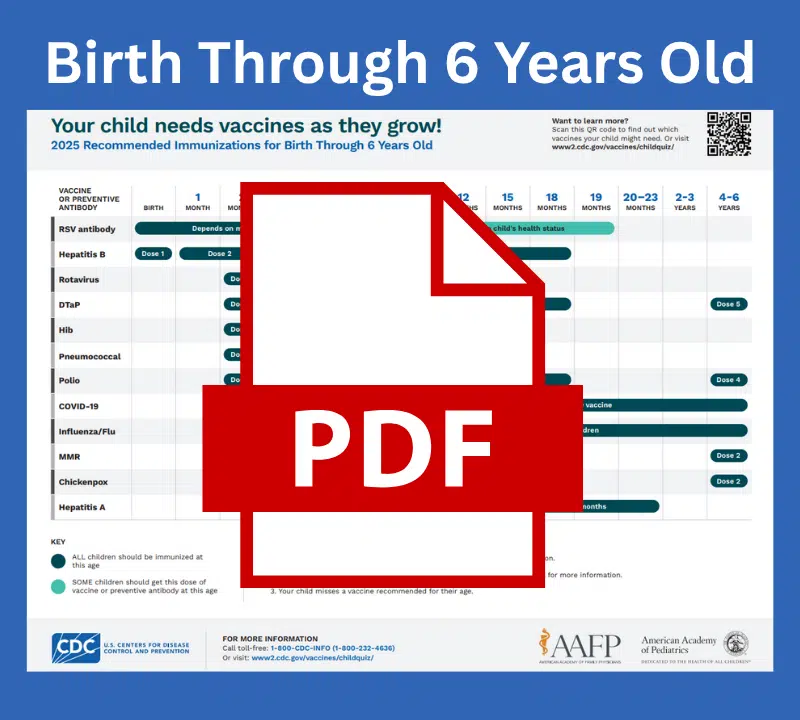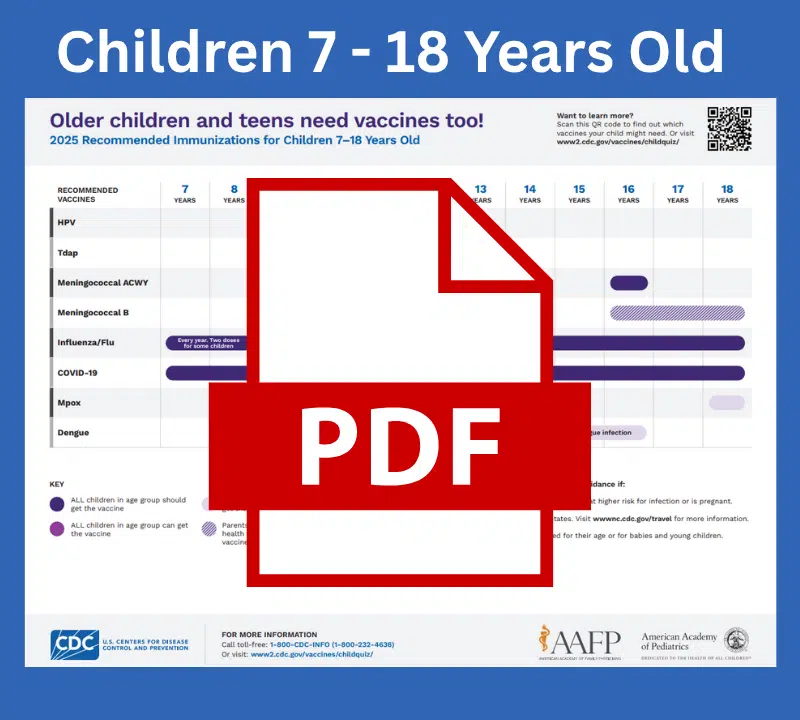Childhood Immunizations
Access resources to help you understand which diseases your child is protected from and at what ages they should receive various vaccinations and boosters.
Importance of Childhood Immunizations
Vaccines protect children from a wide range of serious, potentially life-threatening diseases, including measles, polio, whooping cough, and meningitis. By stimulating the immune system to recognize and fight specific pathogens, immunizations help children build long-term immunity without experiencing the severe consequences of the actual diseases.
Important Update About Measles
The CDC recommends that infants under 12 months old who are traveling internationally should:
- Get an early dose at 6 through 11 months.
- Then follow up with the recommended schedule
More information about measles and international travel can be found on the CDC’s website.
Vaccines in Older Children and Teenagers
Maintaining up-to-date immunizations through age 18 is especially important as children enter school, participate in sports, travel, and prepare for adulthood. Certain vaccines, like those for HPV, meningococcal disease, and the annual flu shot, are crucial during the teenage years when risk factors and exposures can change. Following the recommended immunization schedule ensures maximum protection during key developmental stages and helps prevent outbreaks in schools and communities. Ultimately, staying on track with vaccinations is one of the most effective, proven ways to promote lifelong health and prevent the spread of preventable diseases.
Staying on schedule with vaccines from infancy through adolescence not only safeguards individual health but also contributes to community immunity, helping protect those who cannot be vaccinated due to medical reasons.
Regular visits with your child’s care provider in addition to printable vaccine schedules provided by the CDC can help parents stay on track with their child’s vaccination schedule.
Vaccine Schedules
Education About Vaccines
In today’s digital age, parents are inundated with an overwhelming amount of information about vaccines, much of it conflicting and unreliable. The sheer volume can make it difficult to distinguish fact from misinformation, leading to confusion and hesitancy.
To make informed decisions about their children’s health, parents should turn to vetted, trustworthy sources such as Vaccine Information Statements (VIS) provided by the CDC. These official documents are based on scientific evidence and are designed to clearly explain the benefits and potential risks of vaccines, ensuring that parents have accurate, up-to-date information to guide their choices.
Vaccine Information Statements
PDF ⇓ Covid-19
PDF ⇓ DTaP (Diphtheria, Tetanus, Pertussis)
PDF ⇓ Hepatitis A
PDF ⇓ Hepatitis B
PDF ⇓ Hib (Haemophilus Influenzae type B)
PDF ⇓ HPV (Human Papillomavirus)
PDF ⇓ Influenza (Flu – Inactivated or Recombinant)
PDF ⇓ Influenza (Flu – Live, Intranasal)
PDF ⇓ Meningococcal ACWY
PDF ⇓ Meningococcal B
PDF ⇓ MMR (Measles, Mumps & Rubella)
PDF ⇓ MMRV (Measles, Mumps, Rubella & Varicella)
PDF ⇓ Smallpox/Monkeypox (JYNNEOS) [mpox]
PDF ⇓ Multi Pediatric (DTaP, Hib, Hepatitis B, PCV, Polio)
PDF ⇓ Pneumococcal Conjugate
PDF ⇓ Pneumococcal Polysaccharide (PPSV23)
PDF ⇓ Polio
PDF ⇓ Rotavirus
PDF ⇓ RSV (Respiratory Syncytial Virus)
PDF ⇓ Td (Tetanus, Diptheria)
PDF ⇓ Tdap (Tetanus, Diphtheria, Pertussis)
PDF ⇓ Varicella
If you have any questions or concerns about vaccinations for your child, don’t hesitate to have a conversation with your child’s pediatrician or family medicine provider.



